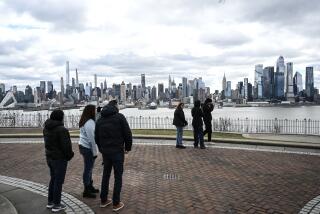Envision an America Not Ruled by Money
Before we become too irate over the successful effort by Bernard Schwartz of Loral to buy the U.S. government, we should take some comfort from the fact we are receiving a fascinating history lesson. We are learning what it must have been like to live in the incandescent 1920s, when pygmies ruled the land: every aspect of national life was subordinated to the accumulation of wealth by a minority of citizens, the stock market reached an all-time high, the national oil reserves were bartered away, the voting public ignored crimes and scandals at the highest reaches of government and Walt Disney introduced Mickey Mouse to the world.
It was a glorious time. A boom time. The serious underlying ills of society were ignored or denied. In other words, it was much like our own time. The age of Harding and Coolidge has given way to the age of Bush and Clinton; the decade of Henry Ford to the decade of Bill Gates.
Logically it would seem that a prosperous America, a powerful America, would use this time to address the injustices of our own society. But logic does not rule national affairs. Money does.
Of course, this always has been true. It is inherent in the nature of wealth and those who create or accumulate it. But at other times, we have had public leaders who were willing to use public power to defy and oppose the centers of private power in order to ameliorate the distress of the citizens whom they were elected to serve. That is no longer the case.
Mediocrity shrinks from large problems. And when that mediocrity is political, it seeks to create the illusion of leadership by redefining our problems in trivial terms. But smaller classes or school uniforms will not restore a decaying educational system. Nor will a “conversation on race” remedy an affliction we have been talking about for more than two centuries.
Indeed, our present public leaders--from the White House to the halls of Congress--reserve their most intense passions for issues of trade, budget “reform,” the International Monetary Fund, etc., whose resolution is of most concern to private power. They cloak their concern for the fate of the wealthy with a demagogic insistence that we all will be better off if large businesses can increase profits or lower costs. Nor is it an accident that the most respected among our leaders are the secretary of the Treasury and the chairman of the Federal Reserve Board--they hold the keys to the chambers of gold.
Even as scandals unmatched for dimension and variety since Warren Harding fascinate, titillate and enrage, they also divert attention from the far larger iniquities of a political system that refuses to address the most serious and deeply rooted injustices, ensuring that they will continue and deepen.
The issue of race, for example, is the denial of economic opportunity to the great majority of black Americans (while extending it to a fortunate few, but that’s the way things work in America). Its resolution would take a great deal of energy and resources, but it’s much easier and cheaper to have a “conversation.”
The scandalously unjust distribution of income that funnels most of our increasing wealth to a handful seems forbidden, not only to action but even to discussion, except by a few fuzzy headed radicals who don’t seem to realize that this is the best of all possible systems. After all, isn’t everybody doing well? Of course not. Most of the middle class struggles to make ends meet and the number of the dismally impoverished continues to grow. We are told so unremittingly that we are prosperous that those under serious financial pressure think there must be something wrong with them. This is an attitude that will change, with serious political consequences, once the wave crests. And waves have a habit of cresting.
Difficult as it will be to resolve these issues, they become more complex and immense in the context of a global economy whose structural flaws are not even the subject of serious debate. The industrial world has built a capacity to produce far more than it can sell--too many cars, too much steel, soon even too many computers. And cruising the world in search of cheap labor--indentured labor “Nike-style”--with the collaboration of its partners in government ensures that the ability to buy these goods will not be there. It is repeating on a global scale exactly the economic distortions that led from the glorious 1920s into the grim ‘30s.
What will happen to the poor American if capital, industry, businesses are free to go anywhere they think they can make more money at lower cost? It would seem imperative to consider the way we will live in such a world, before we are told that it was all inevitable.
These are the kinds of questions a serious American government--that is, a government that is serious about America--should be discussing. And who knows? Maybe some day we’ll have that kind of government.
More to Read
Start your day right
Sign up for Essential California for news, features and recommendations from the L.A. Times and beyond in your inbox six days a week.
You may occasionally receive promotional content from the Los Angeles Times.






